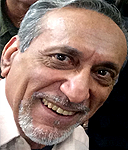Join JPI UE
Faq
FAQ
Please click here for the frequently asked questions we collected.
If you have an additional questions you are welcome to mail us at info@jpi-urbaneurope.eu
The goal of SUGI is to rapidly evolve the knowledge base, advance indicators and assessment tools that are needed for a comprehensive understanding of the Food-Water-Energy nexus. We asked Hassan Virji, Ex-Officio Member Board of Directors START International, Inc; Adjunct Professor at University of Maryland in College Park, and Jonas Bylund, JPI Urban Europe’s Management Board, who have been working with the strategy behind the SUGI and Belmont Forum–JPI Urban Europe collaboration on the issue of sustainable urbanisation and the food-water-energy nexus approach since 2015 what they expect from the projects in terms of contributing to critical mass and important breakthroughs.
 What do you expect will be the most important contributions from the funded projects? Will they contribute to building critical mass in any particular area?
What do you expect will be the most important contributions from the funded projects? Will they contribute to building critical mass in any particular area?
– I expect to see a critical mass developed in knowledge platforms concerning integrated approaches on urban (including relational issues) food-water-energy issues and in systemic innovation for urban transformations in these areas on the ground, both in shaping new markets as well as increased know-how on integrated and co-creative approaches among urban development institutions – local, national, global.
Why is international research cooperation in this field of research so important?
– Because, as usual in both urban research as well as in urban innovation, it makes sense to get out of your sandbox or duck-pond and avoid re-inventing the wheel on your own. The greater the number of people from different contexts who are working on similar challenges, the more we increase the chances of ground-breaking approaches. Furthermore, the urban food-water-energy nexus is one way to invite actors from areas, fields, and sectors to work on how to communicate and integrate across ‘silos’. In such situations, it’s beneficial not to fixate on national taken-for-granted ways of doing things.
 Hassan Virji has been working with the strategy behind the SUGI and Belmont Forum–JPI Urban Europe collaboration on the issue of sustainable urbanisation and the food-water-energy nexus approach since 2015.
Hassan Virji has been working with the strategy behind the SUGI and Belmont Forum–JPI Urban Europe collaboration on the issue of sustainable urbanisation and the food-water-energy nexus approach since 2015.
What do you expect will be the most important contributions from the projects?
– In our rapidly urbanizing world, sustained availability of resources and related management of goods and services is a key challenge. The SUGI-FWE initiative is a timely and strategic international effort to utilize trans-disciplinary methodologies and systems approaches to address critical issues of urban energy, water, food resource flows in different regional socio-economic and cultural context. The effort will support innovative research projects that will lead to an informed framework for determining trade-offs and synergies to meet future demand, while increasing urban resilience and resource efficiency, without compromising safeguards for the environmental protection.